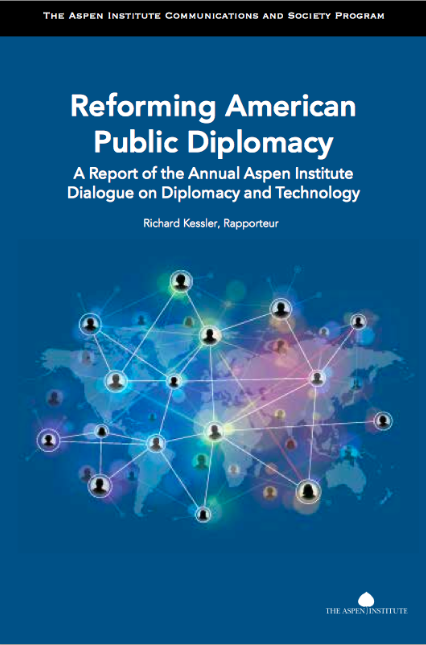BBG Watch Commentary
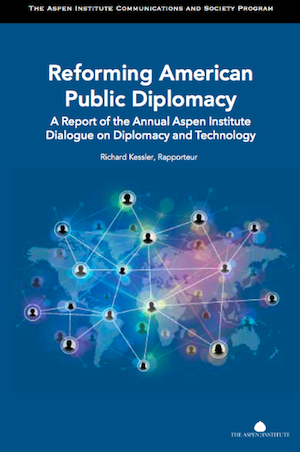 According to a new report released by the Aspen Institute, at the third annual Aspen Institute Dialogue on Diplomacy and Technology meeting in early August 2014, U.S. policy and technology heavyweights, including two former chairs of the BBG and its current chair, the current Undersecretary of State for Public Diplomacy, a former Secretary of State, current and former members and staff of Congress from both sides of the aisle, various industry experts and former government officials from State, the NSA, the FCC, and Commerce, on a bi-partisan basis strongly recommended that the Senate support the House-passed United States International Communications Reform Act of 2014 (H.R. 4490).
According to a new report released by the Aspen Institute, at the third annual Aspen Institute Dialogue on Diplomacy and Technology meeting in early August 2014, U.S. policy and technology heavyweights, including two former chairs of the BBG and its current chair, the current Undersecretary of State for Public Diplomacy, a former Secretary of State, current and former members and staff of Congress from both sides of the aisle, various industry experts and former government officials from State, the NSA, the FCC, and Commerce, on a bi-partisan basis strongly recommended that the Senate support the House-passed United States International Communications Reform Act of 2014 (H.R. 4490).
One of the participants at the Aspen Institute conference last August was former Secretary of State Madeleine Albright.
Another group of U.S. foreign policy heavyweights, public diplomacy experts and journalists, including another former U.S. Secretary of State, also reached more recently very similar conclusions on the need to reform U.S. taxpayer-funded media outreach abroad managed by the Broadcasting Board of Governors (BBG).
The BBG is both a federal agency, with a vast bureaucracy, and the bipartisan board. Recommendations to reform the BBG and improve U.S. public diplomacy were presented in a study, “Reassessing U.S. International Broadcasting.”
Similarly to experts who spoke at the Aspen Institute conference last year, but whose recommendations were included in a recently published report, the other group of experts, which included former U.S. Secretary of State George P. Shultz, also expressed strong support for many of the reforms proposed in H.R. 4490, the United States International Communications Reform Act of 2014.
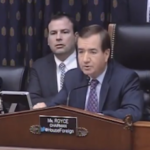
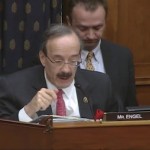
A new compromise version of the same bill with some modifications to protect Voice of America’s (VOA) journalistic independence, was reintroduced by U.S. Rep. Ed Royce (R-CA), Chairman of the House Foreign Affairs Committee, and Committee Ranking Democrat Rep. Eliot Engel (D-NY). H.R. 2323 – the United States International Communications Reform Act of 2015 will be marked-up by the Committee Thursday, May 21, 2015. Easy passage through Foreign Affairs Committee and the House is expected.
H.R. 2323 reiterates the reforms proposed in H.R. 4490, legislation Royce and Engel introduced in April 2014. The Committee unanimously passed H.R. 4490 in April 2014; the House passed H.R. 4490 in July 2014; the Senate never considered H.R. 4490. According to well-informed sources on the Hill, this time the Senate is interested and will take the bill up.
The new legislation represents a compromise with many competing factions and nobody is getting 100% of what they want, including Congress. The question is whether or not the White House will try to stop the legislation. Rep. Royce and Rep. Engel are ready to work with the White House and the State Department to get the bill passed by Congress and signed by the President, sources told BBG Watch.
Congressional staffers from both parties are concerned that agency bureaucrats will hunker down in old or new positions until the composition of the current BBG board changes once again and they can return the agency to the complete dysfunction of the past that served them well but made U.S. international media outreach, particularly by the Voice of America, largely ineffective against Russia, China, Iran and other players.
Supporters say that the reform bill is better than the status quo and future budget cuts from deeply dissatisfied Congress. There are some good people currently on the BBG board, but their terms are limited and they could be out the door in months — something the International Broadcasting Bureau (IBB) and VOA bureaucracy always counts on, the bill’ supporters said. What comes next?, some of them asked. Fix the structure so the agency is no longer dependent on personalities for success, they told BBG Watch.
The BBG’s top leadership welcomes the CEO language in the new legislation and consolidating of the grantees, but some oppose the idea of two boards and two CEOs, one for the Voice of America and the other for the grantee media outlets: Radio Free Europe / Radio Liberty (RFE/RL), Radio Free Asia (RFA) and Middle East Broadcasting Networks (MBN). They think that the language about the Voice of America in the new legislation is still confusing.
Supporters of the bill point out that consolidation only serves the interests of the dysfunctional bureaucracy. Agency bureaucrats complain about two CEOs and two boards as too bureaucratic because they would be quite happy to be able to protect and expand their own dysfunctional bureaucratic empire, supporters of the Royce-Engel reform bill told BBG Watch. By separating the surrogate broadcasters from the Voice of America and the rest of the federal bureaucracy which would be drastically reduced under the new legislation with the International Broadcasting Bureau being abolished, each element can concentrate on its own mission, the bill’s supporters say.
H.R. 2323 supporters also point out that while criticizing the idea of two CEOs, agency bureaucrats say nothing about the current situation in which dozens of mini-CEOs and their large staff try to stifle and micromanage journalists and are moved from one position to another after their failures become too obvious. The Voice of America has seen recently a slew of embarrassing journalistic missteps and omissions, unbalanced reporting, videos and TV programs of substandard production quality, and dismal social media statistics on audience engagement while senior managers are being moved to new positions by VOA Director David Ensor who has announced his departure which is expected shortly. Problems have also been seen with some of the English language content of the Radio Free Europe / Radio Liberty website, which may be caused by shortage of staff. SEE: VOA and RFE/RL fail to report online in English on Putin’s defense of Nazi-Soviet Pact, BBG Watch, May 13, 2015. RFE/RL, which analyzed Putin’s comments immediately in Russian, eventually produced an analysis in English.
In response to a request from Rep. Ed Royce for assistance in getting a new version of the Broadcasting Board of Governors reform legislation passed by the U.S. Senate this year “to confront Russian propaganda” and “to get reform that this troubled agency needs,” U.S. Secretary of State John Kerry promised cooperation, speaking at a recent congressional hearing:
“All I can say, Mr. Chairman, I’m with you 100% on this. I look forward to working with you further. I appreciate your leadership.” “I’ve had long conversations with our Undersecretary for Public Diplomacy Rick Stengel, who is very seized with some things we need to try to achieve,”Secretary Kerry added.
Secretary Kerry mentioned that there is some disagreement as to whether the BBG needs two CEOs.
In addition to Chairman Royce and Ranking Member Engel, H.R. 2323 is co-sponsored by Rep. Chris Smith (R-NJ), Rep. Ileana Ros-Lehtinen (R-FL), Rep. Dana Rohrabacher (R-CA), Rep. Steve Chabot (R-OH), Rep. Ted Poe (R-TX), Rep. Matt Salmon (R-AZ), Rep. Jeff Duncan (R-SC), Rep. Brad Sherman (D-CA), Rep. Albio Sires (D-FL), Rep. Gerry Connolly (D-VA), Rep. Ted Deutch (D-FL), and Rep. Bill Keating (D-MA).
A report of the Annual Aspen Institute Dialogue on Diplomacy and Technology, “Reforming American Public Diplomacy,” was written by Dr. Richard Kessler. He has 25 years of congressional service, which included such positions as Staff Director of the Committee on Foreign Affairs, U.S. House of Representatives and Professional Staff Member of the Foreign Relations Committee, U.S. Senate.
The report carries the following disclaimer: “This report is written from the perspective of an informed observer at the Aspen Institute Dialogue on Diplomacy and Technology. Unless attributed to a particular person, none of the comments or ideas contained in this report should be taken as embodying the views or carrying the endorsement of any specific participant at the Dialogue.”
One of the participants in the August 2014 Aspen Institute discussion was Broadcasting Board of Governors (BBG) Chairman Jeff Shell. He is believed to support some of the reforms proposed in H.R. 4490 and H.R. 2323, especially the creation of a strong CEO position, while raising questions about some of the other language in the legislation. H.R. 2323 changed some of the controversial wording in H.R. 4490 Royce-Engel bill about Voice of America.
However, both the report’s author and Charles M. Firestone, Executive Director Communications and Society Program of the Aspen Institute, stated that participants in the August 2014 Aspen Institute meeting strongly recommended reforming both the Broadcasting Board of Governors and the State Department’s public diplomacy apparatus, what they refer to as the “R Bureau.”
In the introduction to the Aspen Institute report said:
“They recommended, as a needed first step, the adoption of H.R. 4490, which has been passed in the House of Representatives and was pending in the U.S. Senate. It would replace the BBG with a new International Communications Agency (USICA), with its own Chief Executive Officer, managing the daily operations of Voice of America and the Cuban broadcasting entity. And it would create the Freedom News Network, with its own CEO, to operate the surrogate broadcasters such as Radio Free Europe and the Middle East Broadcasting Networks.”
Dr. Kessler noted in the report:
“One of the first steps agreed to at this meeting was to endorse passage of H.R. 4490, the House-passed United States International Communications Reform Act of 2014, which attempts to streamline America’s international broadcasting media. Passage was not seen as a panacea for all the problems facing public diplomacy, but it was seen as an immediate step that could be taken in addressing some of the challenges to America’s public diplomacy.”
Participants in the August 3-6, 2014 Aspen Institute meeting in Aspen, Colorado included: Elliott Abrams, Senior Fellow for Middle Eastern Studies, Council on Foreign Relations; Madeleine Albright, Chair, Albright Stonebridge Group; Howard Berman, Senior Advisor, Covington & Burling, LLP; Colin Crowell, Vice President, Global Public Policy, Twitter; Ted Deutch, Ranking Member, Middle East and North Africa Subcommittee, U.S. House Committee on Foreign Affairs, U.S. House of Representatives; Reed Hundt, Chief Executive Officer, Coalition for Green Capital; Walter Isaacson, President and Chief Executive Officer, The Aspen Institute; Cameron Kerry, Distinguished Visiting Fellow Brookings Institution and Visiting Scholar MIT Media Lab; Richard Kessler, Rapporteur for the Roundtable; Tom Korologos, Strategic Advisor DLA Piper; Marc Nathanson, Chairman, Mapleton Investments; Craig Newmark, Founder and Customer Service Representative, Craigslist; Dina Powell, Global Head of Corporate Engagement and Head of Urban Investment Group, Goldman Sachs Foundation; John Rendon, President and Chief Executive Officer, The Rendon Group; Charlie Firestone, Executive Director Communications and Society Program, Vice President, The Aspen Institute; David Gorodyanksy, Chief Executive Officer and Co-Founder, AnchorFree; Jerry Green, President and Chief Executive Officer, Pacific Council on International Policy; Christopher Hill, Dean, Josef Korbel School of International Studies University of Denver; Thomas Hill, Professional Staff Member U.S. House Committee on Foreign Affairs; Alec Ross, Senior Fellow, Columbia University School of International and Public Affairs; Juliana Rotich, Executive Director, Ushahidi; Jeff Shell, Chairman, Universal Filmed Entertainment Group NBCUniversal and Chairman, Broadcasting Board of Governors; Anne Marie Slaughter, President and Chief Executive Officer, New America Foundation and Richard Stengel, Under Secretary of State for Public Diplomacy and Public Affairs, U.S. State Department.
Chairman of the House Foreign Affairs Committee, Rep. Ed Royce, issued a statement welcoming The Aspen Institute’s release of its report “Reforming American Public Diplomacy.”
“The Aspen Institute report reflects the consensus of the group that met last August to discuss reform to America’s public diplomacy including the Broadcasting Board of Governors. The report reaffirms the need for sweeping BBG reforms and endorses the legislation that the House passed unanimously last Congress and was reintroduced last week. We cannot continue to allow our public diplomacy efforts to flounder, endangering our national security,” Rep. Royce said.
In an earlier statement about H.R. 2323, Rep. Eliot Engel said:
“It’s time to breathe new life into American international broadcasting by modernizing and streamlining the BBG. I’m proud to cosponsor this legislation with Chairman Royce and I’m eager to push forward with these needed reforms,” Rep. Engel said.
One significant difference between the 2014 and the 2015 bipartisan reform bill is the elimination of a controversial wording that the Voice of America’s “accurate, objective, and comprehensive news and related programming,” which reflects the current wording of the VOA Charter and is not controversial, also be “consistent with and promotes the broad foreign policies of the United States.” The word “promotes,” which created controversy, was eliminated from the 2015 bill and substituted with “presents.”
Al Pessin, a VOA foreign correspondent, criticized the original 2014 bill in his The Los Angeles Times 2014 op-ed, “Back off, Congress, and keep Voice of America real.”
While the title of the op-ed was probably chosen by the editorial staff, the author, who represented only himself, kept referring to the bill as “the Royce bill,” even though the 2014 legislation was fully bipartisan, as is the new Royce-Engel H.R. 2323 bill.
Draft report language for H.R. 2323 seen by BBG Watch strongly suggests that Voice of America’s role should be to support U.S. public diplomacy through credible journalism:
“This legislation makes clear that the Voice of America (“VOA”) is an indispensible element of United States public diplomacy efforts by serving as a consistently reliable and authoritative source of news on the United States, its policies, people, and the international developments that affect the United States.”
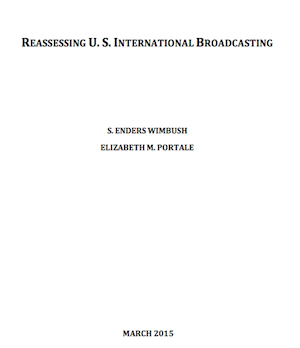 Another group of U.S. foreign policy heavyweights made observations similar to those in the Aspen Institute report in a new study, “Reassessing U.S. International Broadcasting.” The study was written by a former Broadcasting Board of Governors member S. Enders Wimbush and a former Radio Free Europe / Radio Liberty (RFE/RL) executive Elizabeth Portale. It offers a sometimes blistering critique of the current setup and management of U.S. international broadcasting and calls for a comprehensive reform.
Another group of U.S. foreign policy heavyweights made observations similar to those in the Aspen Institute report in a new study, “Reassessing U.S. International Broadcasting.” The study was written by a former Broadcasting Board of Governors member S. Enders Wimbush and a former Radio Free Europe / Radio Liberty (RFE/RL) executive Elizabeth Portale. It offers a sometimes blistering critique of the current setup and management of U.S. international broadcasting and calls for a comprehensive reform.
Those interviewed for the study included former Secretary of State George P. Shultz, former chairmen of the Broadcasting Board of Governors, Marc Nathanson and Amb. James Glassman, former Voice of America directors Geoffrey Cowan and Robert Reilly, former RFE/RL President Dr. Jeffrey Gedmin, former U.S. Ambassador to Russia Michael McFaul, National Endowment for Democracy President Carl Gershman, former Freedom House President David Kramer, Dr. Francis Fukuyama, and several other prominent American scholars, diplomats, journalists and media experts.
One senior BBG official who wants to remain anonymous told BBG Watch that reading the study was a “very disappointing and even frustrating” experience.
“The bottom line is everyone agrees that the BBG structure is flawed and … need[s] a CEO. And most everyone now agrees that influence is more important than reach. The hard questions are now how … [to] accomplish this influence from (1) an operational and structural standpoint, (2) a content standpoint, and (3) an access/distribution standpoint. And for those questions the ‘study’ is silent.”
“‘blow it up and start over’, … always sounds great until you have to start deciding what you are actually going to build once you destroy what you’ve got, and there is no consensus on that!,” a senior BBG official also told BBG Watch.
The study’s authors admit that it does not offer one overreaching solution as it reflects various points of view of the interviewees. Most, if not all of them, reportedly have agreed, however, that the current Broadcasting Board of Governors structure is poorly designed and badly implemented.
A former Voice of America foreign correspondent Gary Thomas called it “a skewed study, culled primarily from a policy perspective to reach a policymaker’s conclusions on the relationship between journalism and government broadcasting. In addition to lacking a working journalist’s perspective, it is weighted for surrogate broadcasting, and against VOA.”
“But what policymakers have never understood is that once you take up journalism as a tool in support of a cause or a goal or a policy – however noble – it crosses the line and ceases to be journalism. It becomes something else: advocacy, or public relations, or propaganda. But, whatever you call it, it is not journalism, and should not be labeled as such. But that is exactly what the many in the study (and soon-to-be-reintroduced legislation) propose: to expropriate the good name of journalism to fly it under a false flag,” former Voice of America correspondent Gary Thomas wrote.
S. Enders Wimbush and Elizabeth Portale responded to Thomas’ criticism:
“Our interviewees, including some excellent journalists, did not agree with Thomas that the choice was between pure journalism and propaganda, a dichotomy he sets up unambiguously. Similarly he rejects the notion that the “firewall” between the interests of journalists and those of policymakers is overblown. Our interviewees, mostly from the policy side, but including journalists, were less categorical. If U.S. international broadcasting is to be fixed, these existential questions will require clear answers.”
Former Voice of America director David S. Jackson has published an opinion article on the Public Diplomacy Council (PDC) website in which he argues for combining journalistic objectivity and independence with greater attention being paid by VOA reporters to covering U.S. foreign policy news and cultivating news contacts with U.S. government officials, but without taking orders from the State Department or the White House.
“Yet the debate over its [VOA’s] future has been stuck on two irreconcilable positions: One would leave VOA completely independent journalistically, as it is now, with no oversight and virtually no influence by the State Department or any other branch of government; the other would bring VOA under the direct supervision of State or another government policy-oriented institution.
I believe there is a middle path that could satisfy the concerns of both sides,” former VOA director David Jackson wrote.
David Jackson’s recommendations are similar to some of those expressed at the third annual Aspen Institute Dialogue on Diplomacy and Technology meeting in August 2014 attended by a group of 24 leaders in the diplomatic and technology fields. The Aspen Institute report also to a large degree echoes conclusions of the Wimbush-Portale study based on interviews with other prominent American diplomats, scholars and some journalists.

